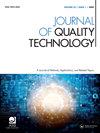基于定量和定性因素的自适应区域序列设计在高性能计算机配置中的应用
IF 2.6
2区 工程技术
Q2 ENGINEERING, INDUSTRIAL
引用次数: 0
摘要
摘要针对高性能计算(HPC)系统中寻找最优配置的需求,提出了一种基于定性和定量因素的自适应区域序列设计(ARSD)方法。定性和定量因素的实验在其他应用中也遇到过。该方法考虑了加性高斯过程下的序贯设计准则,以处理定性和定量因素。此外,所提出的顺序过程的适应性允许从自适应设计区域中选择下一个设计点,从而在优化的开发和探索之间实现有意义的平衡。给出了自适应设计区域的理论依据。通过仿真算例验证了该方法的有效性。以高性能计算性能优化为例,进一步阐述了该方法的优点。关键词:适应性设计实验开发与探索设计aussian流程优化配置感谢编辑和审稿人的建设性意见,他们的意见使本文有了很大的改进。数据可得性声明支持本研究结果的数据可根据通讯作者的合理要求获得。披露声明作者未报告潜在的利益冲突。项目资助:国家自然科学基金项目(批准号:12001155)和河北省自然科学基金项目(批准号:12001155)。A2022208001)。林的工作得到了加拿大自然科学与工程研究委员会的支持。作者简介:夏财,河北科技大学理学院副教授。XuLi Xu是弗吉尼亚理工大学统计系的博士生,他的电子邮件地址是lix1992@vt.edu.C。林春芳,英国女王大学数学与统计系教授。她的邮箱地址是devon.lin@queensu.caYili洪怡丽,弗吉尼亚理工大学统计系教授。他的邮箱地址是yilihong@vt.edu.Xinwei邓新伟,弗吉尼亚理工大学统计系教授,他的邮箱地址是xdeng@vt.edu。本文章由计算机程序翻译,如有差异,请以英文原文为准。
Adaptive-region sequential design with quantitative and qualitative factors in application to HPC configuration
AbstractMotivated by the need of finding optimal configuration in the high-performance computing (HPC) system, this work proposes an adaptive-region sequential design (ARSD) for optimization of computer experiments with qualitative and quantitative factors. Experiments with both qualitative and quantitative factors are also encountered in other applications. The proposed ARSD method considers a sequential design criterion under the additive Gaussian process to deal with both qualitative and quantitative factors. Moreover, the adaptiveness of the proposed sequential procedure allows the selection of next design point from the adaptive design region achieving a meaningful balance between exploitation and exploration for optimization. Theoretical justification of the adaptive design region is provided. The performance of the proposed method is evaluated by several numerical examples in simulations. The case study of HPC performance optimization further elaborates the merits of the proposed method.Keywords: Adaptive designdesign of experimentexploitation and explorationGaussian processoptimal configuration AcknowledgementWe are grateful to the editor and the referees for their constructive comments that have helped improve the article significantly.Data availability statementThe data that support the findings of this study are available from the corresponding author upon reasonable request.Disclosure statementNo potential conflict of interest was reported by the authors.Additional informationFundingThe work by Cai is supported by the National Natural Science Foundation of China (Grant No. 12001155), and the Natural Science Foundation of Hebei Province of China (Grant No. A2022208001). The work by Lin is supported by the Natural Sciences and Engineering Research Council of Canada.Notes on contributorsXia CaiXia Cai is an Associate Professor in the School of Science at the Hebei University of Science and Technology. Her email address is caixia@hebust.edu.cn.Li XuLi Xu is a PhD candidate in the Department of Statistics at the Virginia Tech. His email address is lix1992@vt.edu.C. Devon LinChunfang Devon Lin is a Professor in the Department of Mathematics and Statistics at the Queen’s University. Her email address is devon.lin@queensu.caYili HongYili Hong is a Professor in the Department of Statistics at the Virginia Tech. His email address is yilihong@vt.edu.Xinwei DengXinwei Deng is a Professor in the Department of Statistics at the Virginia Tech. His email address is xdeng@vt.edu.
求助全文
通过发布文献求助,成功后即可免费获取论文全文。
去求助
来源期刊

Journal of Quality Technology
管理科学-工程:工业
CiteScore
5.20
自引率
4.00%
发文量
23
审稿时长
>12 weeks
期刊介绍:
The objective of Journal of Quality Technology is to contribute to the technical advancement of the field of quality technology by publishing papers that emphasize the practical applicability of new techniques, instructive examples of the operation of existing techniques and results of historical researches. Expository, review, and tutorial papers are also acceptable if they are written in a style suitable for practicing engineers.
Sample our Mathematics & Statistics journals, sign in here to start your FREE access for 14 days
 求助内容:
求助内容: 应助结果提醒方式:
应助结果提醒方式:


